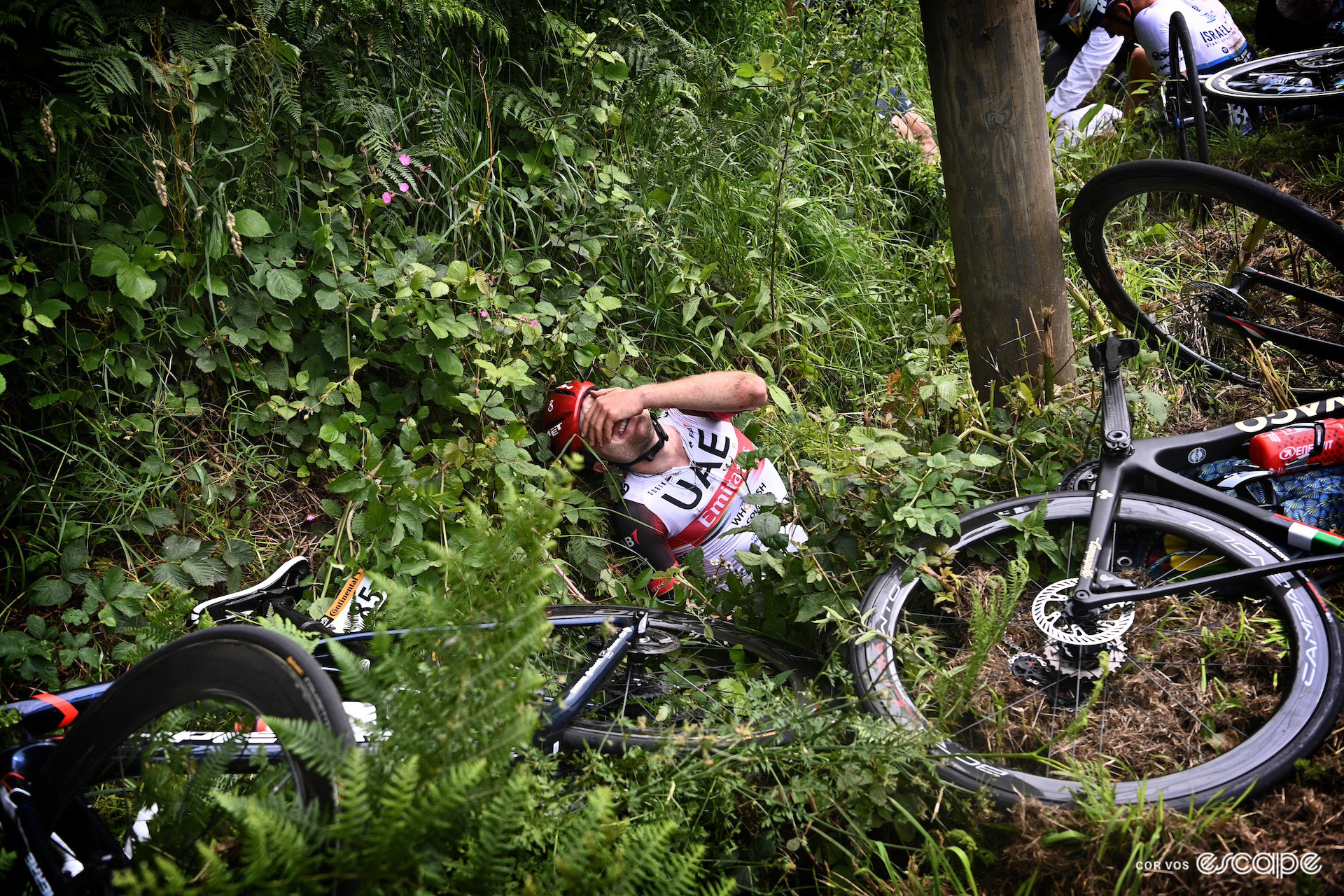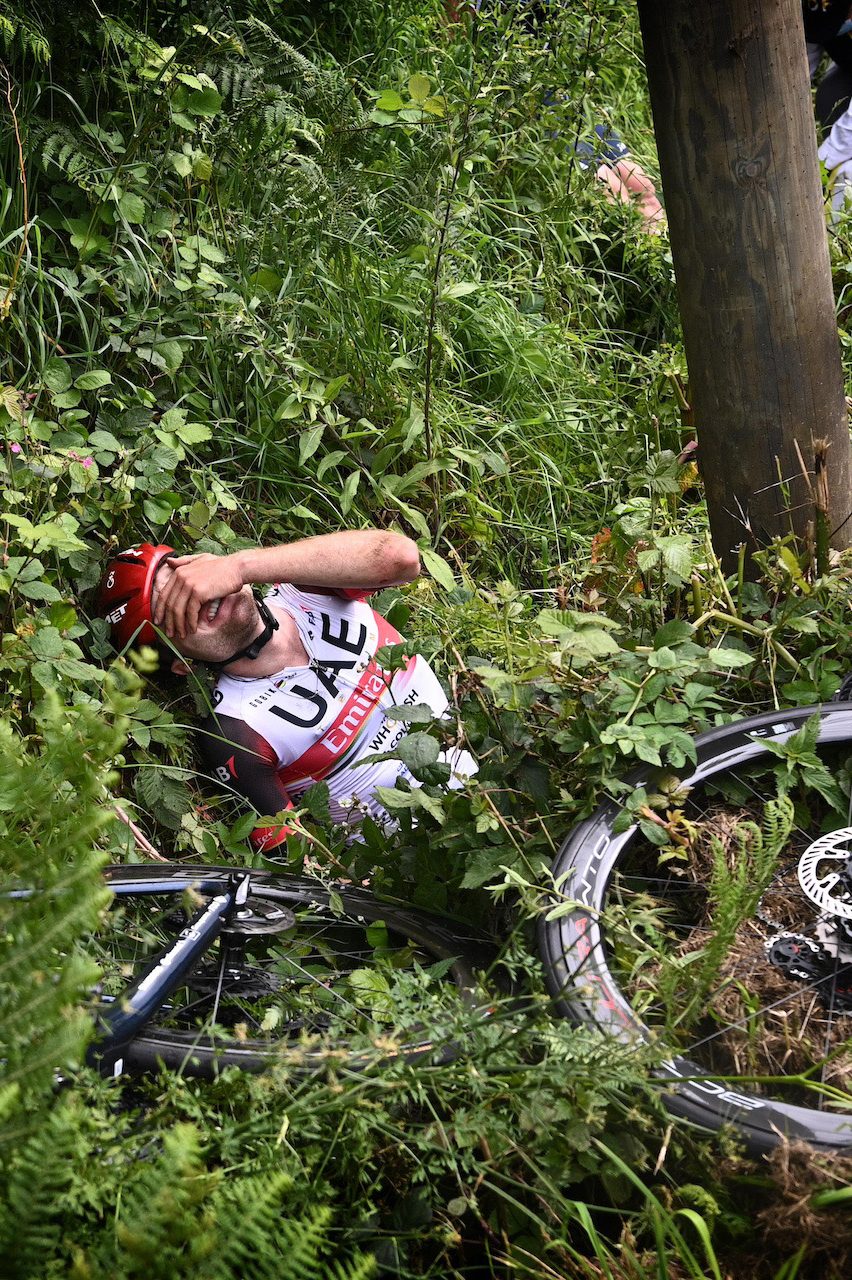“The big news as we start stage 2 of the Tour de France is that Einer Rubio is coming off the bench to replace Enric Mas, who’s off the road injured.”
Is this the future of cycling?
Amid new and re-surfacing doping stories, and Mark Cavendish’s first victory in extra time, this past week has seen the stirrings of a debate over substitutions in cycling, which is part of a wider conversation covering attempts to future-proof the sport. First came the speculative comments of fabled Movistar team boss Eusebio Unzué in Colombia, then a flurry of responses and retorts from his peers, as fans and followers of the sport began to imagine what this future might look like.
Unzué is accompanying his stellar squad at the Tour Colombia, where Nairo Quintana is making his return alongside new teammates and compatriots Iván Sosa and Fernando Gaviria at their home race. Despite the sprinter’s stage 1 victory over Cavendish (the Brit finished third behind second-place Davide Persico of Bingoal WB; yes, Silvia’s little brother), it’s Unzué whose name has come up more than any in the blue ‘M’ this week after the veteran general manager ruminated over cycling’s development in a pre-race interview.
“I think this is the most conservative sport,” Unzué told gathered media. “I think almost all sports develop, whereas we’re still doing the same things we’ve always been doing. Since I started in the 1980s, the rules of cycling have changed very little, and I think you need to adapt to the current time. You have to make the regulations and rules more … well, I’m not sure if it’s right to say ‘more human,’ but certainly they should be less brutal.”
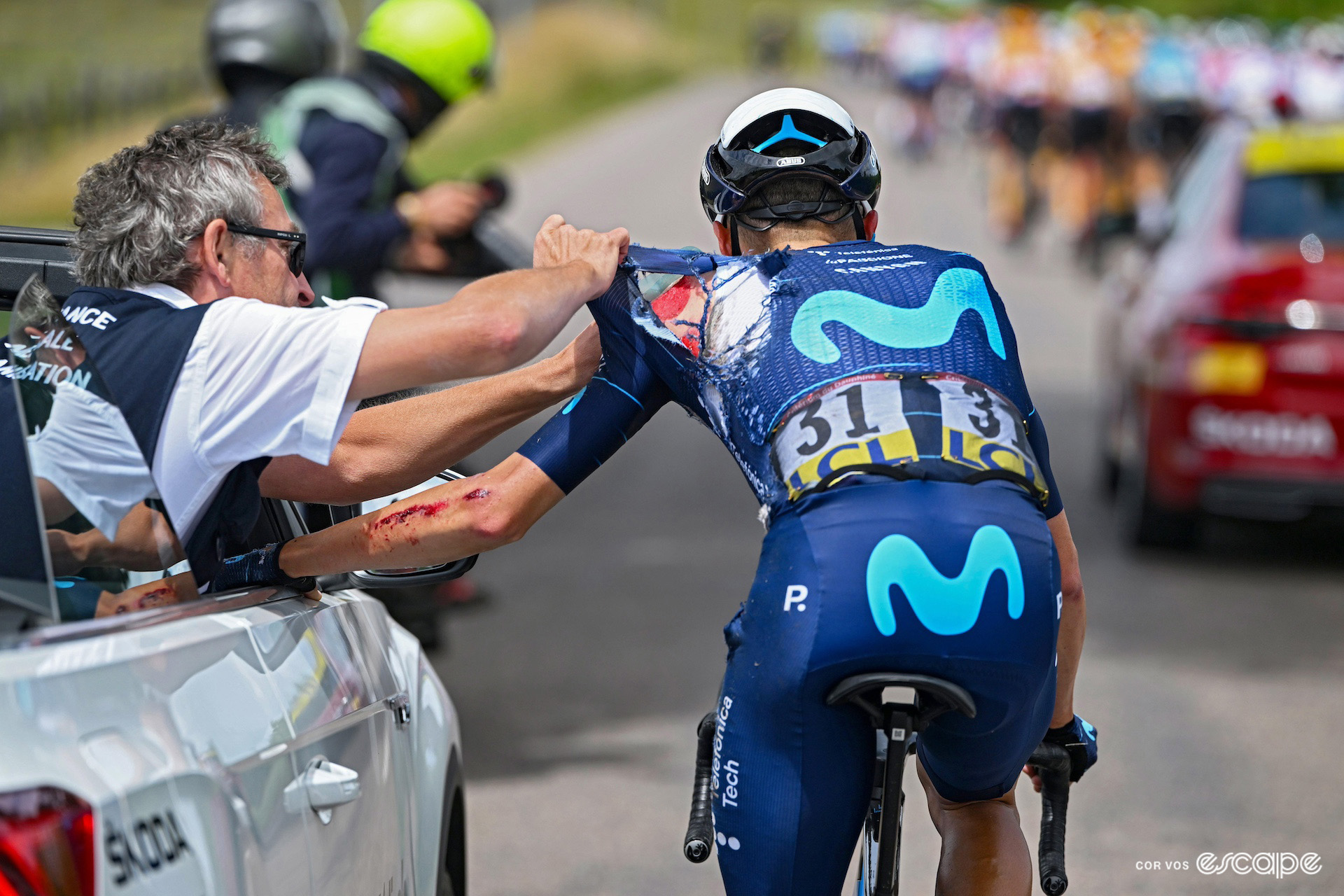
One of the key topics under question was the One Cycling project that is exciting or unsettling depending on who you ask. For Unzué, whose team is apparently not on the list of participants but is involved in ongoing conversations, he is at least encouraged by the desire to take a step forward. However, the Spaniard’s focus in this particular conversation was, unsurprisingly, on possible Grand Tour reforms, proposing both a shortening of the season’s marquee stage races and the idea of substitutions.
“Why don’t we allow substitutions, at least in the first week of a Grand Tour?” he said. “We lost Enric [Mas from the 2023 Tour de France] on the first day to a crash. So why not at least allow us to replace him and have eight riders on the team?
“I think we’ve all grown used to the idea of an epic sport and the belief that all these things form part of the epic nature of the sport. But remember, football didn’t allow substitutions in the past either.”
On the face of it, there is sense to this. You turn up with eight riders to a gruelling three-week race and lose one on the first day, why shouldn’t they be replaced by one of the two or three reserves all teams have on stand-by in case of last-minute disasters before the Grand Depart?
I’m sure most of us have been asked this by friends who pursue more traditional sports where replacements are allowed – like football (or soccer) in which substitution during games (as opposed to before the start when the same wording was used if, for instance, a player didn’t turn up) was first added to the official rules in 1958, and only allowed in World Cup Finals from 1970 – but the more you think about it happening in cycling, the more complicated it gets.
For one thing, the comparison with football is weak at best. Cycling, and stage racing in particular, is an endurance sport, not to mention the many instances of the “race within a race” with the various classifications to consider. And sure, if your star striker gets injured, that adds a certain nervous energy to the story, but whole Grand Tours, whole careers are built on overcoming the bad luck of illness or crashes. A young pretender gets a chance after the leader crashes out, a once-GC team going all-in for swashbuckling stage wins, appealing to your fans with tongue-in-cheek backstage videos as your team is whittled down from powerhouse to we-might-as-well-swap-the-bus-for-a-hatchback.
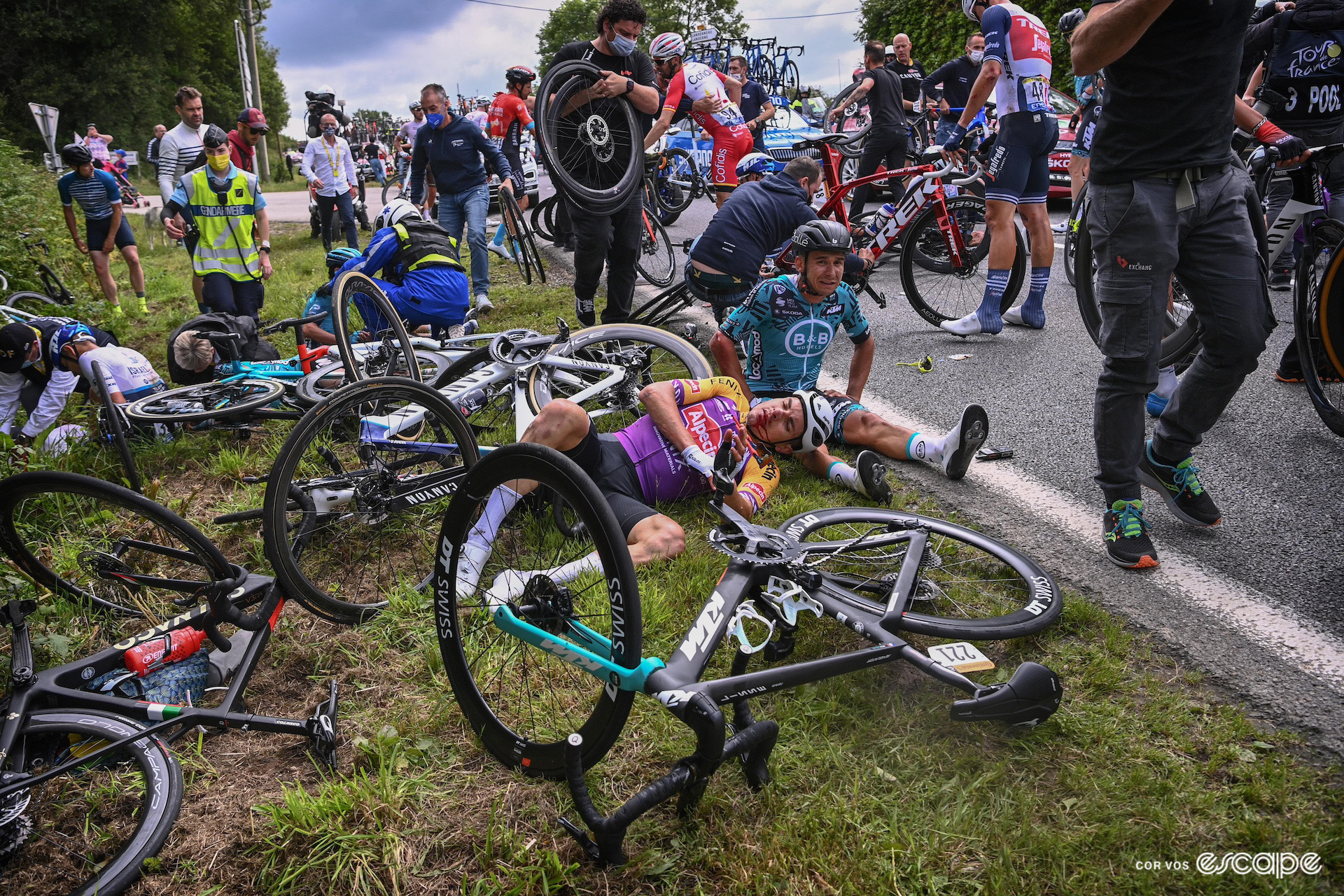
Patrick Lefevere, Unzué’s equivalent at Soudal-Quick Step, was naturally quick to respond, and his view is very much on the side of tradition.
“Unfortunately, crashing and getting sick are part of it,” Lefevere told Het Laatste Nieuws. “A big part of your team’s success is being resilient, being able to switch to a Plan B.
“Those are the moments when the great champions rise up and bounce back from a setback. That’s what people want to see. Racing is like boxing – just because you’re hanging on the ropes at a certain moment doesn’t mean that you lose the match.”
Taking Unzué’s side, though, was another seasoned team boss in Brent Copeland who heads up the GreenEDGE organisation, responding via the artist formerly known as Twitter.
“100% agree (even though this goes against tradition which is always a difficult concept to agree on) however we have had this discussion many times over the past many years, we are one of the few team sports that don’t allow substitutes for injuries, it would make sense and if you wanted to take one step further you could even contribute to the evolving of race tactics, the only thing is the UCI would have to govern the substitution situation closely so no teams take advantage of it! But in general a good concept.”
In his initial pitch, Unzué stipulated that it could only sensibly be allowed in the first week, presumably to maintain at least a semblance of the endurance aspect; imagine getting to the second rest day and swapping your rouleurs for a couple of fresh mountain goats? Nope.
The window of opportunity would be just one consideration for the UCI and race organisers. What would be done about the classifications? Would replacements come in with an automatic deficit of however-many minutes, or be ineligible altogether?
Another of Unzué’s queries dealt with something that has left many literally smarting from the sofa in the past, ruled out of the race after a suspected broken bone turned out to be much more minor, and crucially, still rideable, however unpleasant or masochistic that may be.
“If a rider crashes, can he not climb into a car or ambulance to get examined and then start again the next day if he hasn’t broken anything. Why not?” Unzué said. “We want more humanity. We want to protect the riders’ health.”
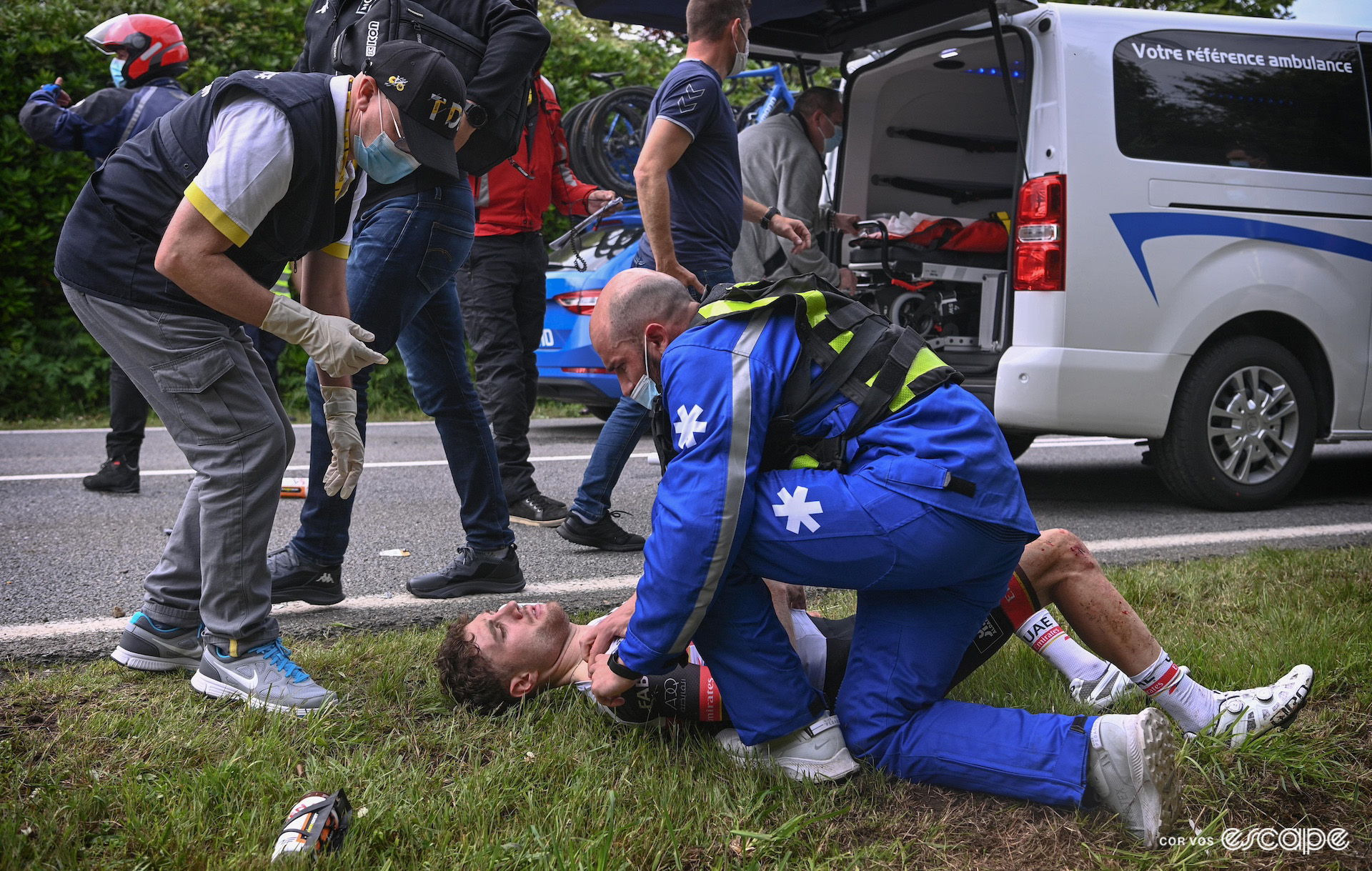
This seems a more palatable change, albeit also needing some restrictions (only if the incident is within the last 30 km? Rider takes the time of the last finisher?), but this brings us to the next issue for the rule-makers: what constitutes a sufficient injury to warrant substitution and/or health check (like the Head Injury Assessment (HIA) protocol introduced by World Rugby, which does allow a temporary replacement)? Or would teams be able to make changes for tactical reasons?
While Copeland is evidently intrigued by the idea of mixing things up tactically through personnel changes, the consensus – if you can call it that – is that changes should be on medical grounds only. Though again, who gets to decide? And how do you weed out the fakers and opportunists, directed to “fall” by teams eyeing a change?
“Racing is not football,” Lefevere said. “Who will determine when an injury or illness is real? I’m already looking forward to the VAR.” He added, with a note of sarcasm, “It will be absolutely impartial and will undoubtedly consist of French doctors.”
Matxin Joxean Fernández, sports manager of UAE Team Emirates, had similar questions.
“It’s complicated,” he told Het Laatste Nieuws. “Who is going to evaluate whether a crash is big enough? How serious should an injury be? Do you have to break your kneecap or is pain in your knee enough? And what about fatigue? After two weeks of racing, exhaustion seems very much like being sick.”
He did however put forward a perhaps more democratic idea that allows or even enforces late changes across the peloton, offering “a simple approach, with no medical criteria: I would give each team the right to switch one rider in the last week.”
If everyone gets to or has to make a change, it’s fair, right? The GC riders each get a new climbing domestique, or the sprinters get a fresh bodyguard for the mountains.
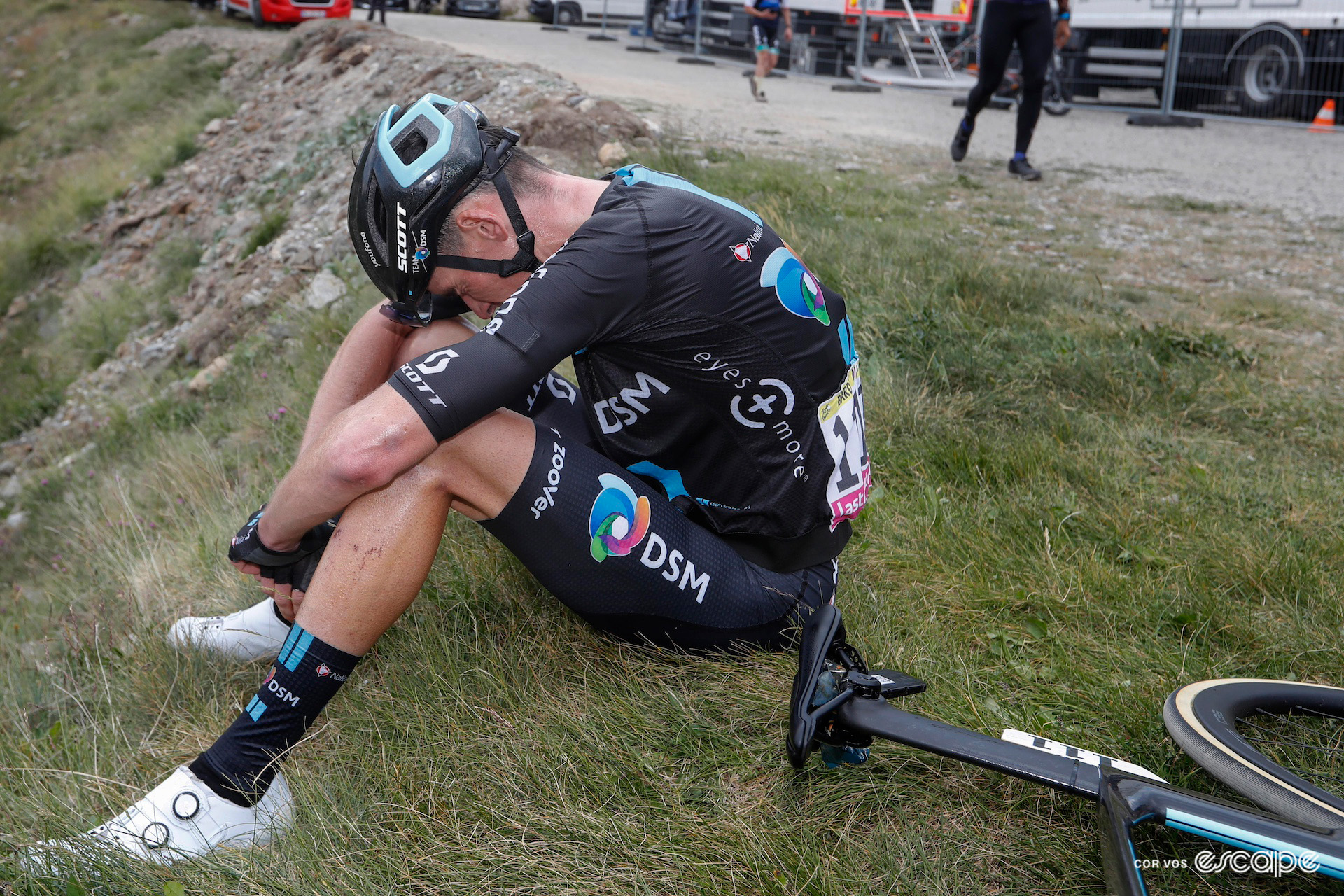
Ultimately, what would it mean? What would come with substitutions in Grand Tours? How might it change the racing, even the sport as a whole?
While it could invigorate an otherwise buttoned-up GC race by adding some energy to the bench, on the other hand, the “purity” and magic of the most “epic” races of the season might be muted by yes-but analysis, which I think would be justified. There’s also a decent chance the races would be overrun further by dominant teams who are able to dial it up even higher in order to meet expectations and achieve their goals. And consider this: imagine being a stage-hunter pipped to the line on stage 16 by some rider who only unpacked their bags the night before.
With the exception of Lefevere, it’s understandable that the majority of this sampling of WorldTour team bosses would support a development that might optimise their teams’ chances. These are, of course, the biggest races of the season around which the likes of Movistar build a whole team and a whole year, even several years. But is it practical? Would it be a step forward or back?
It’s great fun to debate, but without extraordinarily complicated controls, substitutions might only damage the races so many hold so dear.
For once, I’m with Lefevere.
“No, this is going to give us a headache. I’m not going to stop this, but I’m not going to support it either. It will be for cycling after Lefevere.”
Did we do a good job with this story?
